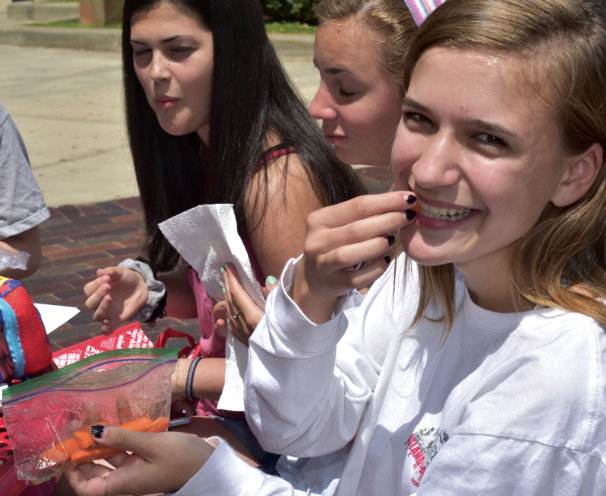Students stop eating red meat to help climate change
Anna Westin has completely removed red meat from her lunch.
Everybody has a routine they follow everyday, and that usually doesn’t change. However, it is becoming more and more apparent to some people, that the way they live their lives is harming the environment. Some Grady students try to fix this by removing red meat from their diets.
“I knew that taking away red meat from my diet was a small change I could make to do my share in helping our planet,” sophomore Anna Westin said. “It’s such a small part of my life, so I know it’s the least I could do.”
The shocking details from the Netflix documentary “Cowspiracy” inspired Westin to make this change in her lifestyle.
“I decided to stop eating red meat because I watched this documentary, and it showed me how much the meat industry affects climate change and global warming,” Westin said.
According to PETA, a single cow produces between 154-264 pounds of methane per year, and to produce only one pound of red meat, it takes over 24,000 gallons of water. All of this gas is building up in the atmosphere and adding to global warming.
“The world is a massive fireball right now, and I’m just honestly scared,” Westin said.
For Westin, the dietary change wasn’t the most difficult part, her main worries revolved around what her parents and peers would think.
“Honestly, the hardest part of it all is the people around me,” said Westin. “I was nervous to tell my parents because I knew they would ask about protein and tell me it’s okay to still have it every once in a while. I knew I would get a hard time from both of them, but honestly, they’ve been pretty good about it all.”
The average hamburger is a quarter pound or half a pound of meat, which equates to between 6,000 and 12,000 gallons of water for one meal and more water will be conserved by choosing to not eat that half pound burger than by not showering for three months, according to PETA.
“The effects of the production on the environment and the carbon footprint it leaves, was enough for me to stop,” freshman Mia Otoski said.
For those taking part in the diet, the idea of helping global warming is worth skipping a hamburger.
“It has not been hard for me because I can find other options that still appeal to me, and, in the end, I know I’m making a better choice,” Otoski said.
Although the diet will help the planet long term, it is not always easy to push aside temptations to eat red meat.
“I do crave a hot dog every once in a while, and it’s really hard to say no, so I have slipped up a couple of times,” Westin said. “I always feel major guilt after, and that helps me to stop in the future.”
Since giving up red meat, Otoski has felt like she has made a difference in the world and wants other people to join the movement.
“I would recommend this to everyone because if people watched their red meat intake, we would notice a change in the environment,” Otoski said.
With more participants, the idea of avoiding red meat is spreading among students at Grady, making even more people conscious of how they affect the environment with the food they eat.
“I realized the amount of damage that the system in which red meat comes from does to the environment, so I just stopped eating it,” sophomore Audrey Isakov said. “Anna Westin definitely influenced my decision.”
As more people are trying the diet, or even just reducing their consumption of red meat, fewer people are supporting the corporations that sell the meat, and, in the end, helping climate change.
“I think that other people should at least try to eat less red meat,” Isakov said. “It’s a lot to ask of someone to stop altogether, but as long as you are more conscious and try to eat it in moderation, it can make a huge difference in the bigger picture.”
Although one person can’t singlehandedly change the negative effects of climate change, the damage is inspiring many people to make changes in their daily lives to better the situation.
“I know just me not eating red meat won’t change the world, or change climate change, but I think if we all make little changes to our lifestyle, whether it be to stop eating red meat, or biking more often, or even just recycling, then we can all make the world a better place,” Westin said.







